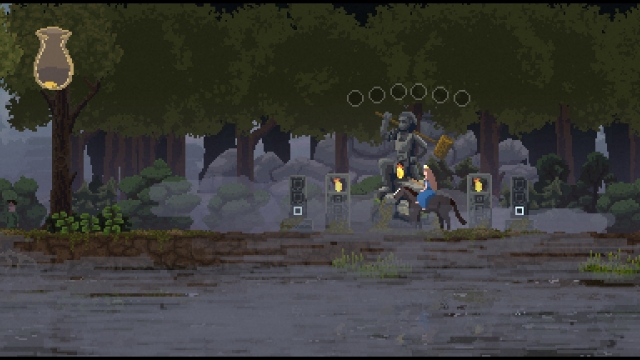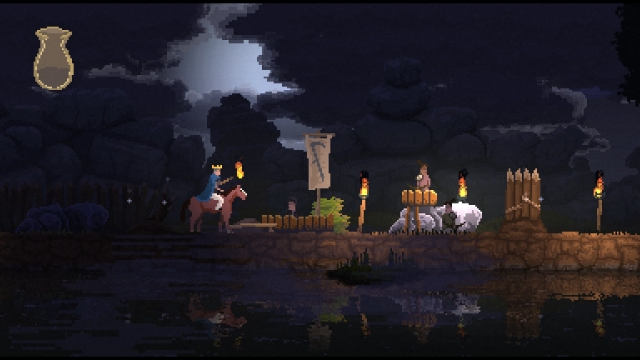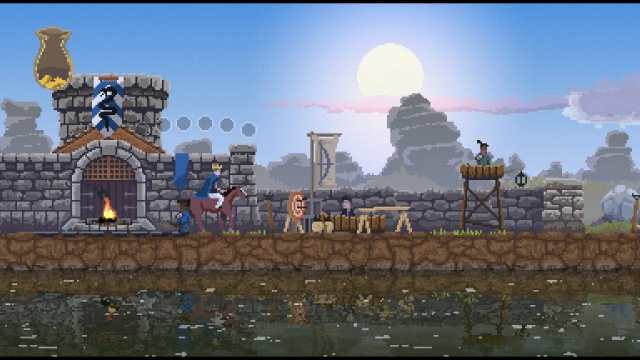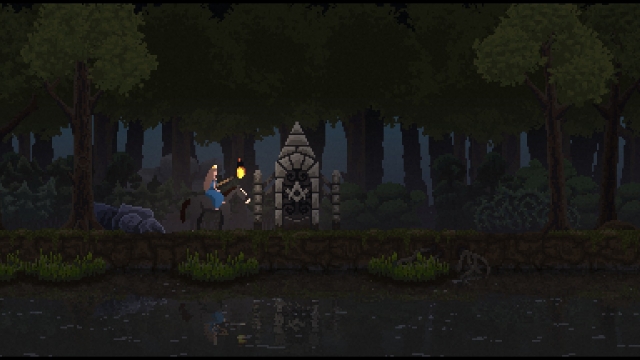
Kingdom Review
It’s safe to say that Kingdom doesn't play safe. With its simple-looking models and environment, one may assume that this is a game that fully relies on the difficulty and originality of its mechanics to appeal the player. Indeed, as any in the long list of challenging roguelikes, Kingdom’s experience is fuelled by self-improvement, full knowledge of the game’s design and in lesser measure, luck. Demanding gameplay is a trope in roguelikes, but Kingdom lacks variety in strategies, an appealing deep lore, or an experience personally tailored to each player, making it not fully able to compete with its inspirations.
With no name, House, or story, you play as the lonely king (or queen) of your own isolated DIY kingdom, whose goal is to bring peace to the home of the crown. However, you are not quarrelling with the lords of bordering territories; you have to fend off waves of monsters as you expand your domains indefinitely, and recruit valiant vassals willing to give their life for their mute queen. There’s ultimately an endgame, and a very strict recipe to attain it. These monsters, spamming into your world through evil magic portals, are after you; and more specifically, your crown. So just like in real life, your aim is to keep it to yourself and don’t let anybody take it.
 The innovating economy of this game is the big star of the show. Unlike most monarchs nowadays, ours knows that delegation is unreliable, and that one has to do everything himself. So with a pouch of coins tied to your belt, you must travel across the land in search of small settlements of wayward, king-less people, and toss a coin at their feet. This will prompt them to dress up in decent clothing and make their way to your castle, where you can pay to treat them with bows, hammers or scythes. With these coins, you’ll also have to build walls, farms and outposts, upgrade your castle and present your reverence to the gods of bricolage and hunting, which give your units stat boosts for some time.
The innovating economy of this game is the big star of the show. Unlike most monarchs nowadays, ours knows that delegation is unreliable, and that one has to do everything himself. So with a pouch of coins tied to your belt, you must travel across the land in search of small settlements of wayward, king-less people, and toss a coin at their feet. This will prompt them to dress up in decent clothing and make their way to your castle, where you can pay to treat them with bows, hammers or scythes. With these coins, you’ll also have to build walls, farms and outposts, upgrade your castle and present your reverence to the gods of bricolage and hunting, which give your units stat boosts for some time.
This simple but clever use of a singular resource, with low-cost units and low profit, makes its management very straightforward, and the decisions that you will have to make can be the key to surviving one night more in the early stages of your gameplay, where hunting is the best way to earn the sweet hard cash. Once your kingdom is spread enough, your belt pouch will not be big enough to carry all those coins, so much of it is lost on the way. This big contrast between the tight-budget early days and the overflowing later ones is perhaps something that reflects the need for ways to spend money on in the later game. Coins are also a great way to cull the enemies’ attack, since they’ll most likely grab a coin and turn on their toes, leaving you alone for the night.
 When the night falls, and waves of deformed monsters attack your walls, they will do so in order to steal your units’ possessions, your coins and, ultimately, your crown. Every five nights, you’ll encounter a red moon night, where enemies come in larger numbers. And you’d better be ready. By nightfall, you should have your outer walls as fortified as possible, with tons of archers at each side. Upgrading your bonfire will make stone walls or improved outposts available, which is crucial if you want to last further in the game. Farms will also allow for your vassals to produce coins more efficiently, albeit they take very large areas and they’re quickly overrun by monsters.
When the night falls, and waves of deformed monsters attack your walls, they will do so in order to steal your units’ possessions, your coins and, ultimately, your crown. Every five nights, you’ll encounter a red moon night, where enemies come in larger numbers. And you’d better be ready. By nightfall, you should have your outer walls as fortified as possible, with tons of archers at each side. Upgrading your bonfire will make stone walls or improved outposts available, which is crucial if you want to last further in the game. Farms will also allow for your vassals to produce coins more efficiently, albeit they take very large areas and they’re quickly overrun by monsters.
The issue here, is that the linearity of the map, extending to the right and left in a very unidimensional way, thwarts many aspects of the game. First of all, exploration in this game is not particularly deep, as reaching the end of the level in each side can be done in a day. Secondly, there’s no way to circumvent enemies while exploring other than tossing a coin at them and hoping they just take it and run away. If you find an enemy, your only resource is turn back the way you came and hope for your horse to not run out of stamina.
 Your horse can only sprint for a limited amount of time, which means that travelling across the level back to your castle is clunky and tedious. You’ll have to stop every now and then to let your horse recover, and at some points it ends up being annoyingly unnecessary. Moreover, the pace of the game is sometimes too fast compared to the horse's continuous stops and slow galloping speed, which may end up being a bit obnoxious and contradictory. The lack of depth in terms of level design is very much reflected in the gameplay, being dull and repetitive. As there’s so little variety in gameplay — which doesn’t mean that it isn’t deep itself —, the result are vast distances to travel that are same thing over and over.
Your horse can only sprint for a limited amount of time, which means that travelling across the level back to your castle is clunky and tedious. You’ll have to stop every now and then to let your horse recover, and at some points it ends up being annoyingly unnecessary. Moreover, the pace of the game is sometimes too fast compared to the horse's continuous stops and slow galloping speed, which may end up being a bit obnoxious and contradictory. The lack of depth in terms of level design is very much reflected in the gameplay, being dull and repetitive. As there’s so little variety in gameplay — which doesn’t mean that it isn’t deep itself —, the result are vast distances to travel that are same thing over and over.
This repetition allows for a very particular formula to follow, a recipe that once you understand the mechanics and elements of the game, becomes easy to figure out. A quick look to the community guides will show how intuitive and easy-to-grasp this game is. It lacks the difficulty and need for specialisation that games like A Curious Expedition or FTL have. Once you get the hang of it, it’s a game of tic-tac-toe, in spite of the eight hours before that happens, which will keep you gripped until the very end. However, after controlling a few monarchs, each with different colours and emblems, you’ve seen everything there’s to see.
 The art style is something that I find quite functional. The handling of light around the fires and the day/night cycle is something to point out, but other than that, all models, whereas they perfectly cohere altogether, I can’t help feeling that the colour palette is much more effective than the models themselves, which feel as basic as possible. This, with a very aleatory soundtrack with very different beats that come up in seemingly random moments, makes up for an experience that while functional, doesn’t impress as much as some other roguelikes.
The art style is something that I find quite functional. The handling of light around the fires and the day/night cycle is something to point out, but other than that, all models, whereas they perfectly cohere altogether, I can’t help feeling that the colour palette is much more effective than the models themselves, which feel as basic as possible. This, with a very aleatory soundtrack with very different beats that come up in seemingly random moments, makes up for an experience that while functional, doesn’t impress as much as some other roguelikes.
All in all, the mechanics of the game are a very clever twist to the build-your-base systems. The economy is also a very smart simplification of resource-management, and it overall coheres into this tight and enclosed experience that feels challenging, with some disappointing aspects nevertheless. In these roguelikes, there’s a compulsory requirement for variety and replayability, and Kingdom fails to deliver in this regard. Kingdom won’t last long in your hard drive given the great array of much richer experiences out in the roguelike Steam catalogue, but the interesting gameplay concepts that it brings to the table makes it a remarkable exploration of roguelike mechanics.
Kingdom (Reviewed on Windows)
This game is good, with a few negatives.
In these roguelikes, there’s a compulsory requirement for variety and replayability, and Kingdom fails to deliver in this regard. Kingdom won’t last long in your hard drive given the great array of much richer experiences out in the roguelike Steam catalogue, but the interesting gameplay concepts that it brings to the table makes it a remarkable exploration of roguelike mechanics.










COMMENTS